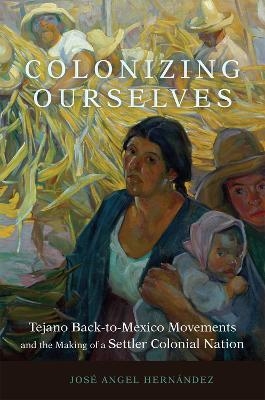
Colonizing Ourselves Volume 5
Tejano Back-to-Mexico Movements and the Making of a Settler Colonial Nation
Seiten
2024
University of Oklahoma Press (Verlag)
978-0-8061-9459-2 (ISBN)
University of Oklahoma Press (Verlag)
978-0-8061-9459-2 (ISBN)
In the late nineteenth century, the Mexican government, seeking to fortify its borders and curb migration to the U.S., set out to relocate “Mexico-Texano” families, or Tejanos, on Mexican land. Here, José Angel Hernández explores these movements back to Mexico, also known as autocolonization, as distinct in the history of settler colonization.
In the late nineteenth century, the Mexican government, seeking to fortify its northern borders and curb migration to the United States, set out to relocate “Mexico-Texano” families, or Tejanos, on Mexican land. In Colonizing Ourselves, José Angel Hernández explores these movements back to Mexico, also known as autocolonization, as distinct in the history of settler colonization.
Unlike other settler colonial states that relied heavily on overseas settlers, especially from Europe and Asia, Mexico received less than 1 percent of these nineteenth-century immigrants. This reality, coupled with the growing migration of farmers and laborers northward toward the United States, led ultimately to passage of the 1883 Land and Colonization Law. This legislation offered incentives to any Mexican in the United States willing to resettle in the republic: Tejanos, as well as other Mexican expatriates abroad, were to be granted twice the amount of land for settlement that other immigrants received. The campaign worked: ethnic Mexicans from Texas and the Mexican interior, as well as Indigenous peoples from Mexico, established numerous colonies on the northern frontier.
Leading one of the most notable back-to-Mexico movements was Luis Siliceo, a Texan who, with a subsidized newspaper, El Colono, and the backing of Porfirio Díaz’s administration, secured a contract to resettle Tejano families across several Mexican states. The story of this partnership, which Hernández traces from the 1890s through the turn of the century, provides insight into debates about settler colonization in Mexico. Viewed from various global, national, and regional perspectives, it helps to make sense of Mexico’s autocolonization policy and its redefinition of Indigenous and settler populations during the nineteenth century.
In the late nineteenth century, the Mexican government, seeking to fortify its northern borders and curb migration to the United States, set out to relocate “Mexico-Texano” families, or Tejanos, on Mexican land. In Colonizing Ourselves, José Angel Hernández explores these movements back to Mexico, also known as autocolonization, as distinct in the history of settler colonization.
Unlike other settler colonial states that relied heavily on overseas settlers, especially from Europe and Asia, Mexico received less than 1 percent of these nineteenth-century immigrants. This reality, coupled with the growing migration of farmers and laborers northward toward the United States, led ultimately to passage of the 1883 Land and Colonization Law. This legislation offered incentives to any Mexican in the United States willing to resettle in the republic: Tejanos, as well as other Mexican expatriates abroad, were to be granted twice the amount of land for settlement that other immigrants received. The campaign worked: ethnic Mexicans from Texas and the Mexican interior, as well as Indigenous peoples from Mexico, established numerous colonies on the northern frontier.
Leading one of the most notable back-to-Mexico movements was Luis Siliceo, a Texan who, with a subsidized newspaper, El Colono, and the backing of Porfirio Díaz’s administration, secured a contract to resettle Tejano families across several Mexican states. The story of this partnership, which Hernández traces from the 1890s through the turn of the century, provides insight into debates about settler colonization in Mexico. Viewed from various global, national, and regional perspectives, it helps to make sense of Mexico’s autocolonization policy and its redefinition of Indigenous and settler populations during the nineteenth century.
José Angel Hernández is Associate Professor of History at the University of Houston and the author of Mexican American Colonization during the Nineteenth Century: A History of the US-Mexico Borderlands.
| Erscheinungsdatum | 02.10.2024 |
|---|---|
| Reihe/Serie | New Directions in Tejano History |
| Zusatzinfo | 8 b&w illus., 2 charts |
| Verlagsort | Oklahoma |
| Sprache | englisch |
| Maße | 152 x 229 mm |
| Themenwelt | Sachbuch/Ratgeber ► Geschichte / Politik ► Regional- / Landesgeschichte |
| Geschichte ► Allgemeine Geschichte ► Neuzeit (bis 1918) | |
| Geisteswissenschaften ► Geschichte ► Regional- / Ländergeschichte | |
| Naturwissenschaften ► Geowissenschaften ► Geografie / Kartografie | |
| ISBN-10 | 0-8061-9459-6 / 0806194596 |
| ISBN-13 | 978-0-8061-9459-2 / 9780806194592 |
| Zustand | Neuware |
| Informationen gemäß Produktsicherheitsverordnung (GPSR) | |
| Haben Sie eine Frage zum Produkt? |
Mehr entdecken
aus dem Bereich
aus dem Bereich
Giordano Bruno - ein ketzerisches Leben
Buch | Hardcover (2024)
C.H.Beck (Verlag)
CHF 41,85
das dramatische 16. Jahrhundert
Buch | Hardcover (2024)
Rowohlt Berlin (Verlag)
CHF 47,60
die Fahrt der Bounty und die globale Wirtschaft im 18. Jahrhundert
Buch | Hardcover (2024)
Klett-Cotta (Verlag)
CHF 34,95


